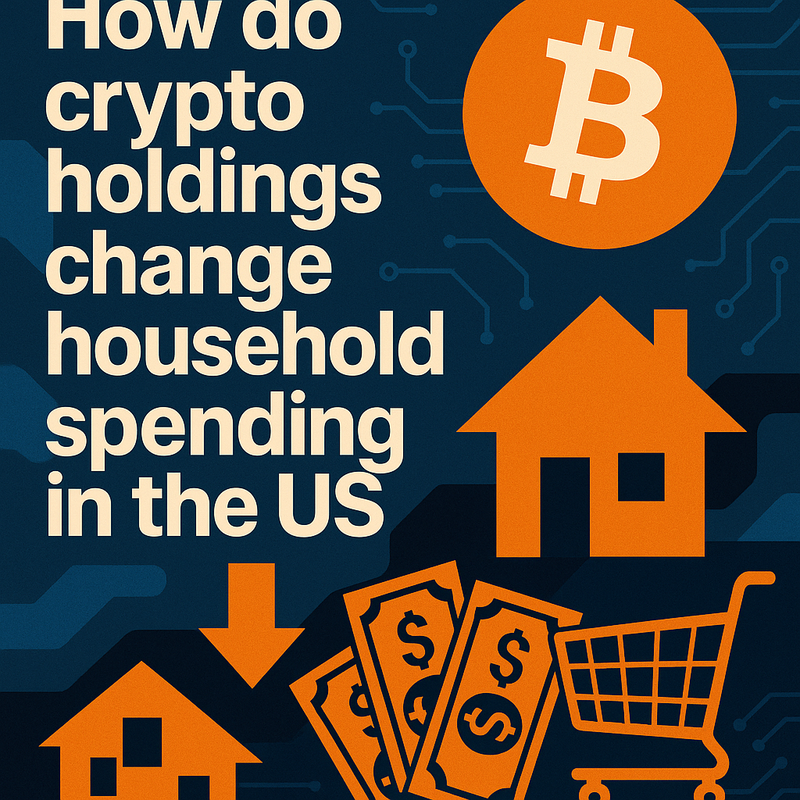
How do crypto holdings change household spending in the US
How Crypto Wealth Is Reshaping American Spending Habits
New research reveals exactly how cryptocurrency gains are transforming household economics—and what it means for your portfolio strategy
The Hidden Economic Engine: Crypto's Spending Multiplier Effect
While most traders focus on price charts and technical indicators, groundbreaking research reveals a powerful underlying force driving crypto markets: the wealth effect on household spending.
This marginal propensity to consume (MPC) from crypto gains is roughly twice the rate of unrealized stock gains but about one-third of housing wealth gains. Why does this matter for traders? Because it reveals a fundamental behavioral pattern that creates predictable market movements.
The Real-World Impact: From Crypto to Concrete
Between 2018 and 2023, approximately 2.8 million U.S. households withdrew at least $5,000 from crypto investments. But here's where it gets interesting:
- Many transitioned from renters to homeowners using crypto profits
- Discretionary spending increased significantly in crypto-rich households
- Local housing markets saw price increases in areas with concentrated crypto wealth
TRADER'S INSIGHT
This spending pattern creates predictable liquidity events. When crypto appreciates significantly, expect increased selling pressure as households convert digital gains into real-world assets.
The Constrained Investor Phenomenon
Research shows that financially constrained households with low savings demonstrate an even higher MPC from crypto gains. These investors are more likely to:
- Take profits more quickly during rallies
- Reallocate crypto gains to traditional assets
- Fund immediate consumption needs
This behavior creates predictable market patterns that sophisticated traders can anticipate.
The $100 Billion Economic Impact
During peak periods, the rise in retail crypto wealth contributed to approximately $30 billion in increased U.S. consumption, with total economic impact reaching $70–$100 billion in early 2021.
| Wealth Source | Marginal Propensity to Consume | Liquidity Characteristics |
|---|---|---|
| Cryptocurrency Gains | ~9% | High liquidity, 24/7 access |
| Stock Gains (Unrealized) | ~4-5% | Market hours, settlement delays |
| Housing Wealth | ~25-30% | Low liquidity, transaction costs |
This data reveals why crypto markets react differently than traditional markets during wealth appreciation periods. The combination of high liquidity and higher spending propensity creates more immediate selling pressure during rallies.
ALGORITHM INSIGHT
Our systems track these macroeconomic patterns to identify optimal entry and exit points, accounting for predictable retail investor behavior during wealth appreciation events.
Turning Research Into Trading Advantage
Understanding these behavioral economics patterns is one thing. Capitalizing on them is another. While retail investors are reacting to wealth effects, professional traders are anticipating these movements.
The challenge for individual traders? You're competing against:
- Algorithmic systems that process these patterns in milliseconds
- Institutional traders with dedicated research teams
- Market makers who understand liquidity flows better than anyone
This is where most traders fail. They're making emotional decisions based on partial information while professionals operate with complete data landscapes.
The question isn't whether these patterns exist—the research proves they do. The question is whether you're positioned to benefit from them or become a statistic.
Stop Reacting to Markets—Start Anticipating Them
Precision buy/sell alerts for just $5/month
Join thousands of traders who use data-driven signals to capitalize on market patterns instead of falling victim to them.
Get Precision Alerts NowPast performance is not indicative of future results. Malosignals provides trading alerts and data analysis, not financial advice. Cryptocurrency trading involves substantial risk of loss.